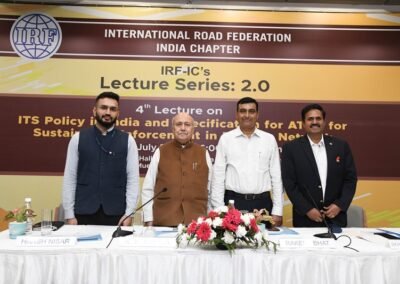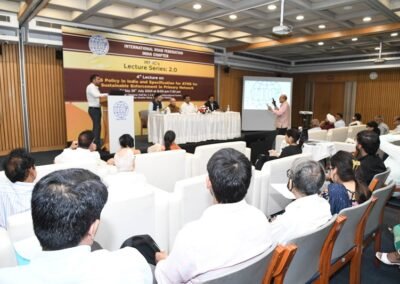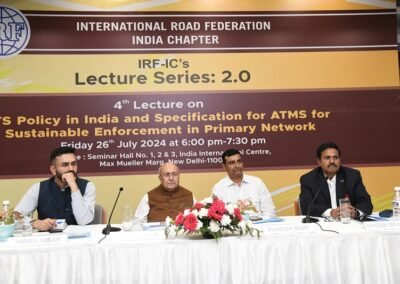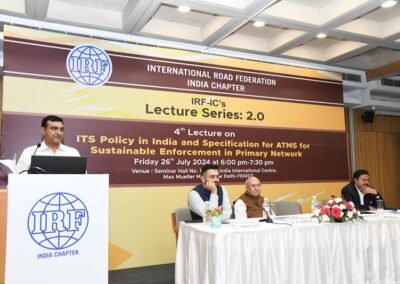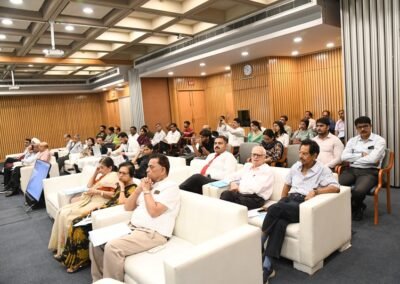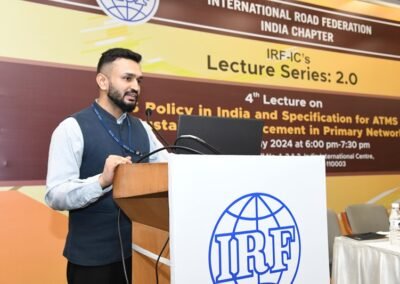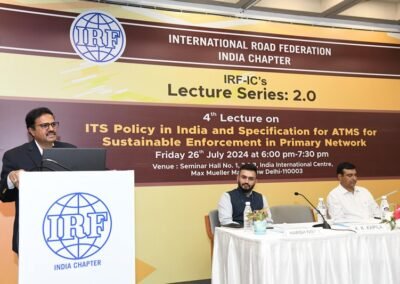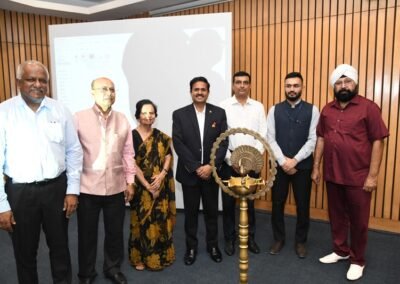
- This event has passed.
Lecture Series : 2.0 :4th Lecture on the subject “ITS Policy in India and Specifications for ATMS for Sustainable Enforcement in the Primary Network”
July 26, 2024 @ 6:00 pm - 7:30 pm
The International Road Federation – India Chapter (IRF-IC) recently hosted its 4th lecture as part of the ongoing Lecture Series 2.0. The focus was on “ITS Policy in India and Specifications for ATMS for Sustainable Enforcement in the Primary Network.” The lecture was moderated by Mr. Akhilesh Srivastava, Executive Vice President, IRF-IC and the Guest Speakers include Mr. Harsh Nisar, Advisor (IT), NHAI and Mr. Rakesh Bhat, General Manager, Trafitek Solutions Pvt. Ltd.
Mr. Akhilesh Srivastava who has been instrumental in ATMS specification during his stint in NHAI, welcome the Guest Speaker and set the tone for the lecture.
Mr. Harsh Nisar, Advisor IT at NHAI, delivered an insightful lecture on the importance of Advanced Traffic Management Systems (ATMS) in India. He emphasized the critical role ATMS plays in reducing incident response times and preventing incidents. The system integrates physical enforcement through route patrol vehicles and digital enforcement via e-challans, with the service of 1033 being a notable example.
In India, Variable Message Signs (VMS) are intended to provide dynamic information but often function like ordinary signboards. Mr. Nisar highlighted that modern cameras are not just for recording videos; they are equipped with features like detecting violations. ATMS software includes provisions for scanning videos at any point, generating incident lists for auditing, and ensuring incident management focuses on prevention.
He stressed the need for a holistic approach to traffic management and mentioned that video recordings should be saved for 180 days. Given the high costs, it is essential to prioritize locations and then empower these areas with the necessary technology.
Mr. Rakesh Bhat, General Manager – Business Development at Trafitek Solutions Pvt. Ltd., delivered an informative lecture on the current challenges and recommendations for Advanced Traffic Management Systems (ATMS) in India. He emphasized that the absence of standardized regulations leads to the purchase of substandard and low-quality products, compromising commuter safety. This lack of uniformity also hinders the seamless integration of various ITMS systems.
The shortage of quality laboratories, evaluation authorities, and certification bodies results in the use of falsely compliant and uncertified products. Mr. Bhat proposed creating Indian Standards (IS) aligned with European standards, along with third-party audits to ensure fair implementation.
Public awareness campaigns are crucial to educate citizens about the benefits of ITS and encourage their active participation. Providing platforms for public feedback and suggestions is also essential. A robust regulatory framework should outline the roles and responsibilities of various stakeholders, compliance requirements, and enforcement mechanisms for ITS implementation.
Collaboration between government entities and private companies is encouraged to leverage expertise, technology, and investment for developing and deploying ITS solutions. Integrating ATMS with urban development plans ensures that infrastructure supports sustainable growth and mobility.
Mr. Bhat noted that various challenges, such as regulatory and policy issues, operational challenges, and funding constraints, can impact the adoption and effectiveness of ATMS.

